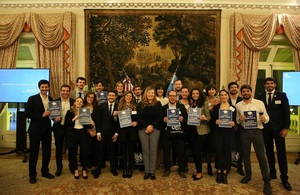The situation on the ground demonstrates the urgent need to make progress towards a Two State Solution
Thank you President. I join others in thanking Mr Wennesland, Mr Lazzarini and Mr Levy for their valuable briefings today.
Let me start by welcoming the two-year anniversary of the Abraham Accords this month. The Abraham Accords are a historic milestone that bring us closer to the goal of shared prosperity and peace throughout the region.
President,
As we stated at the emergency session on 8 August, the UK welcomes the ceasefire in Gaza and we reiterate our calls for the parties to make every effort to sustain it. It is critical that humanitarian access in and out of Gaza is ensured, in accordance with International Humanitarian Law.
We were appalled by the terrorist attack in Jerusalem on 13 August. The UK unequivocally condemns any and all acts of terrorism. Our thoughts are with the victims and families of those affected. We reiterate our unwavering commitment to Israel’s security. This conflict has taken a terrible toll on both sides. We are concerned at the record number of Palestinians killed by Israeli security forces this year and urge Israel to show restraint in the use of live ammunition and to ensure a thorough and transparent investigation into all fatalities.
President,
We have been clear about our concern over the Israeli government’s decision last year to designate six Palestinian NGOs as terrorist organisations. The subsequent raids on the offices of seven Palestinian NGOs, and arrests of their staff, are equally concerning. Civil society organisations play an important role in upholding human rights and democracy and they must be able to operate freely in the Occupied Palestinian Territories. We continue to engage with a number of these organisations.
President,
We call on the Israeli authorities to halt plans to advance evictions at Khan Al Ahmar and on the E1 settlement plan. Advancing E1 would seriously hinder a two-state solution. Settlements are contrary to International Humanitarian Law.
This month we also saw demolition orders issued in Masafer Yatta and against a donor-funded school in Ein Samiya. Such demolitions cause unnecessary suffering and in all but exceptional circumstances are contrary to international law.
The UK is a long-standing supporter of UNRWA for the vital role they play in providing core services and humanitarian and protection assistance to Palestinian refugees across the region. We were pleased to announce at the pledging conference in June that we have agreed a new multi-year funding agreement with UNRWA and will provide £15m this year.
The situation on the ground demonstrates the urgent need to make progress towards a Two State Solution that ensures a safe and secure Israel, living alongside a viable and sovereign Palestinian state based on 1967 lines, with Jerusalem the shared capital of both states. The UK remains committed to working with all parties to reduce tensions and take steps towards a sustainable peace.


